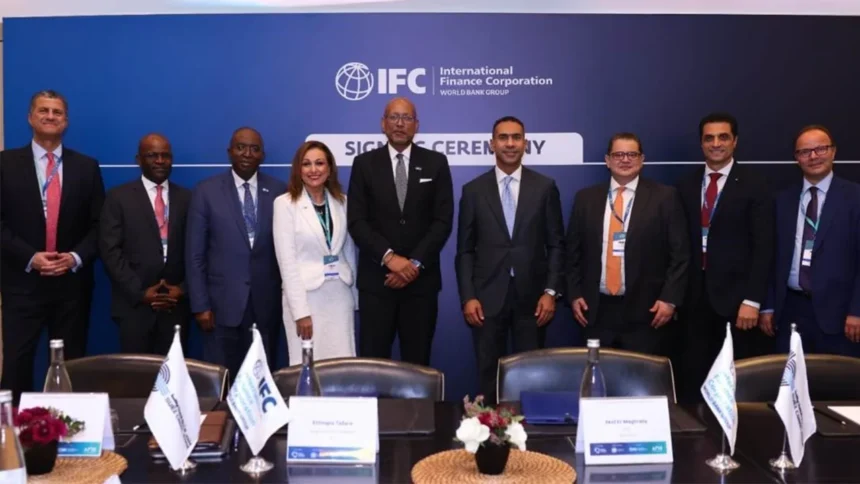The International Finance Corporation (IFC), a member of the World Bank Group, has committed USD 60 million to strengthen financing for micro, small, and medium-sized enterprises (MSMEs) in Egypt through new partnerships with Suez Canal Bank and Attijariwafa Bank Egypt.
The investment aims to unlock lending opportunities for entrepreneurs, particularly women-led businesses and enterprises in underserved communities, while advancing Egypt’s broader economic inclusion agenda.
“By partnering with Suez Canal Bank, IFC is expanding lending to MSMEs, supporting thousands of Egyptian entrepreneurs to grow their businesses,” said Ethiopis Tafara, IFC’s Vice President for Africa.
The agreements, IFC said, are designed to reduce financing barriers for MSMEs, which contribute to more than a third of Egypt’s GDP and employ nearly 40 percent of its workforce, yet remain chronically underserved by the formal banking sector.
What You Should Know
Egypt’s MSME sector has long been recognized as the backbone of its economy, but access to finance remains a persistent challenge.
Many small businesses, especially those led by women or operating outside major urban areas, struggle to obtain credit due to limited collateral, high borrowing costs, and risk-averse banking policies.
The IFC’s USD 60 million commitment is therefore both a financial and strategic intervention, an effort to empower smaller enterprises as engines of job creation, innovation, and inclusive growth.
Through these partnerships, IFC seeks to expand SME lending by over 50 percent within five years, addressing one of the most pressing obstacles in Egypt’s private sector ecosystem: access to capital.
The program also integrates gender inclusion, environmental standards, and risk mitigation mechanisms that align with IFC’s global sustainability principles.
The Two Players Involved
The financing will flow through two of Egypt’s key commercial banks, Suez Canal Bank and Attijariwafa Bank Egypt, both of which play strategic roles in the country’s SME and retail financing segments.
The deals are structured differently but share a common goal; to bridge the financing gap for small businesses and build a more resilient and inclusive economy. Suez Canal Bank, a prominent player with a growing SME portfolio, will receive the larger portion of the financing package.
Meanwhile, Attijariwafa Bank Egypt, part of the Moroccan-headquartered Attijariwafa Group, will collaborate with IFC under a risk-sharing model aimed at de-risking SME lending and enhancing financial inclusion across Egypt’s diverse regions.
Suez Canal Bank’s Deal — And How It Works
Under the agreement, IFC will provide USD 50 million in financing to Suez Canal Bank to bolster its lending to MSMEs across Egypt. A quarter of this funding will be dedicated to women-owned businesses, reflecting IFC’s push to close the gender financing gap.
The funds will primarily target businesses in underserved and rural areas, where access to formal credit remains scarce.
The deal is not just about disbursing loans, it’s about institutional reform. IFC will support the bank in developing and implementing an Environmental and Social Management System (ESMS) that complies with international standards.
This will ensure that the bank’s lending practices promote sustainability, reduce environmental risks, and adhere to social safeguards.
In a statement, Ethiopis Tafara, IFC’s Vice President for Africa, emphasized the partnership’s potential impact:
“By partnering with Suez Canal Bank, IFC is expanding lending to MSMEs, supporting thousands of Egyptian entrepreneurs grow their businesses.”
The collaboration is expected to generate thousands of jobs, stimulate local economies, and encourage a more equitable distribution of financial resources across Egypt’s economic landscape.
Attijariwafa Bank Egypt’s Deal — And How It Works
The second component of the IFC’s investment involves a USD 10 million local-currency risk-sharing facility with Attijariwafa Bank Egypt.
Unlike a direct loan, this facility means IFC will share up to 50 percent of the credit risk on a new SME loan portfolio of up to USD 20 million (around EGP 100 million).
In essence, IFC acts as a partial guarantor, encouraging the bank to lend more freely to smaller enterprises that might otherwise be deemed too risky.
According to Mr. Mouawia Essekelli, CEO and Managing Director of Attijariwafa Bank Egypt, “Through this risk-sharing facility, Attijariwafa bank Egypt will further enhance access to finance for SMEs, reinforcing their role in fostering a resilient, green, and inclusive economy.”
The facility is designed to expand the bank’s SME loan portfolio by more than 50 percent within the next five years.
It also embeds social inclusion targets, at least 25 percent of loans will go to women-owned businesses, while 50 percent will be directed toward SMEs in vulnerable or underserved communities.
This initiative is further supported by a USD 2.5 million investment from the blended finance facility under the Prospects Partnership (PROSPECTS), an initiative spearheaded by the Government of the Netherlands to enhance employment and inclusion in developing economies.
The Long-Term Agenda of the Deal
Beyond immediate financing, IFC’s dual partnerships aim to reshape Egypt’s SME financing ecosystem for the long term.
By empowering local banks to adopt sustainable lending practices and risk-sharing mechanisms, the IFC is laying a foundation for systemic financial inclusion, where banks increasingly see small businesses as viable, creditworthy clients rather than high-risk borrowers.
Moreover, the introduction of environmental and social governance (ESG) principles through the Suez Canal Bank partnership speaks of a shift toward green and responsible banking in Egypt.
This could help the country attract more international investment, align with global sustainability trends, and prepare its private sector for future climate-related financing opportunities.
In the coming years, the IFC expects these interventions to ripple through the financial system, boosting productivity, stimulating entrepreneurship, and promoting equitable economic participation among women and youth.
The Big Picture: Why This Matters
Egypt’s economy is currently navigating multiple challenges, from inflationary pressures to limited private sector job creation.
Small businesses are widely seen as a crucial solution to these issues, capable of absorbing labor, driving innovation, and sustaining local communities. Yet, limited financing has long stifled their growth.
By channeling funds through established banks and integrating gender and sustainability targets, IFC’s move marks a strategic push toward inclusive and sustainable development.
It represents a model of how development finance institutions can collaborate with local banks to unlock private-sector potential in emerging markets.
As Mr. Essekelli of Attijariwafa Bank noted, the partnership “reinforces the role of SMEs in fostering a resilient, green, and inclusive economy.”
Similarly, IFC’s Tafara described the deals as a way to “support thousands of Egyptian entrepreneurs grow their businesses.”
Together, these statements underscore a shared commitment which is building an Egypt where small enterprises, from women-led startups in Cairo to rural workshops in Aswan, can access the financial tools they need to thrive.
_________________
Bookmark Techparley.com for the most insightful technology news from the African continent.
Follow us on X/Twitter @Techparleynews, on Facebook at Techparley Africa, on LinkedIn at Techparley Africa, or on Instagram at Techparleynews






